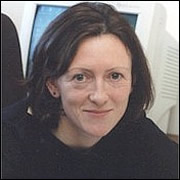Approximately one in 1,000 babies are born with some degree of deafness, making this the most common sensory deficit in humans. Around half of these cases have a genetic cause and more than 100 mutations have so far been identified in the genes that are responsible for normal function of a critical part of the auditory system, the cochlea. Deafness Research UK is funding a new pilot study to better understand the genetics behind this type of hearing loss. 
Dr Pauline Phelan
Drs Pauline Phelan and Nerissa Marziano, at the University of Kent, will collaborate with scientists at the UCL Ear Institute in London to investigate the hearing organ in the fruit fly Drosophila melanogaster. Fruit flies and mammals, including humans, have evolved remarkably similar mechanisms for processing sound. Many of the genes required for the development and functioning of the fruit fly equivalent of the cochlea are also known to have counterparts in mammals.
The eight month study will aim to find out whether the 'gap junction' - a type of channel that connects cells together and is vital for mammalian hearing - is present in the fruit fly 'cochlea' and, if so, whether gap-junctions are important for fruit fly hearing. Mutations in gap-junction genes are known to be responsible for around 80% of hereditary sensorineural deafness, so finding gap-junctions in the fruit fly ear would give researchers the chance to apply the powerful tools already developed to manipulate fly genes to tackling deafness.
"There are clear parallels between the fly and mammalian auditory organs in terms of their development and function. However, the fly ear is simpler than the mammalian ear and, crucially, there are highly sophisticated techniques available in Drosophila to manipulate gene expression. This makes the fruit fly an excellent model for studying the genetic basis of hearing" said Dr Phelan.
Taken from www.deafnessresearch.org.uk/Filling a gap in our knowledge of hearing+5089.twl

